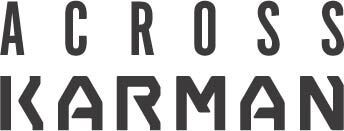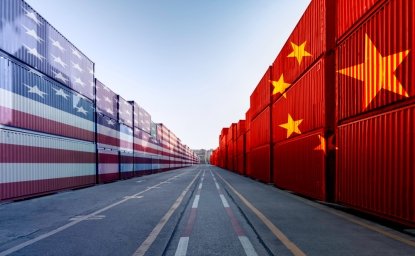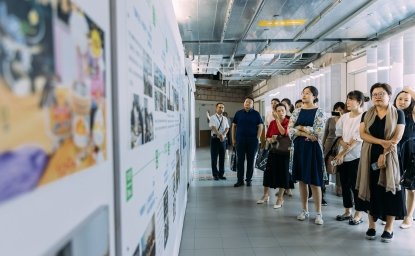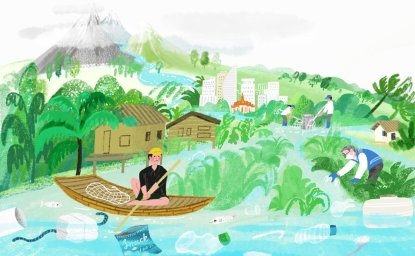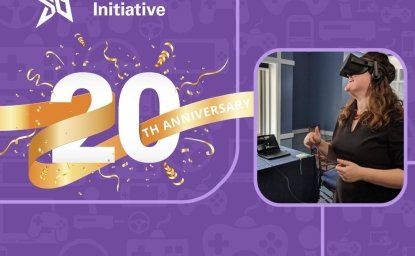The is an unedited transcript
Hello, I'm John Milewski, and this is Wilson Center NOW, a production of the Woodrow Wilson International Center for Scholars.
My guests today are Elizabeth Newbury, director of the Serious Games Initiative and also a senior program program associate with the Wilson Center Science and Technology Innovation Program. And Jennifer Turner, who is director of the Wilson Center's China Environment Forum. They're here today to talk about a new collaboration called the Plastic Pipeline, and more about that in a moment Jennifer.
You know, when I was preparing for the interview, I see 25 years you've been at this. We're celebrating the Kennedy Institute's 50th anniversary this year. You're coming up on 25. That's quite an accomplishment as well. Thank you so much. I, I think I have the best job in D.C. and working on China. Energy and environment and climate can be has been kind of an area of diplomacy between the two countries.
And then an added plus is I've been able to work with Elizabeth Newbury on creating an educational video game on plastic because I love games, too. Well, we're going to turn to Liz in a minute. But first, before we do, if you'd set the scene with, just give us the overview of what the plastics problem is. Well, the world we are drowning in plastics.
I mean, there are these numbers that I can't even visualize, but since 1950, we produce something like 8.3 billion metric tons of plastics, and half of that has been in the last 20 years. And most of the past 20 years it's been single use plastics. And our cities are overwhelmed with this tsunami of plastics. I mean, they try to sort it.
They try to get it recycled. But we can't recycle our way out of this crisis. It just there's not enough of a demand. A lot of it is leaking out into the ocean. You've seen all the pictures with the turtles and the other sea animals. I mean, it's it's also in our bodies, microplastics. Plastics are coming from washing our polyester clothes.
We're breathing it in. It's in our bloodstreams. It's not good.
People always feel virtuous when they recycle, but you're saying we can't recycle our way out of the problem.
So I'm just wondering, do we know what percentage of single use plastics are actually recycled? A little less than 15%. And that's in great part because a lot of the plastics, single use plastics that we use that which includes like little wrappers around our cucumbers and things. It's very problematic. It's hard to recycle it. It downgrades if you tried to recycle it and it just hard to capture.
And so, yeah, so it's just it's too big of a burden because the amount of plastic that's coming out, I mean, right now, it's evidently something like one garbage truck full of plastic every minute into the ocean every day. Wow. And by 2040, the amount of plastic waste that we're producing will at least triple. That's a lot of garbage trucks.
Well, Liz, that problem sure puts the serious in games, doesn't. This is no laughing matter, you know, But. But we'll take a step back before we dig into the new game. And just if you would, give our viewers a bit of an overview on the whole concept of serious games. I know we've talked to you about it before, but it's been a while since you've been on now.
And I know your Physical ship program or game has been played now by over 3 million people worldwide. So these things are quite the hit. Yeah. So thank you for that. Serious games more or less means games that are not just strictly for entertainment. So games that have either an educational value or some other sort of training or pro-social value.
These can be games that are either designed for that purpose. So a lot of our games are designed for some sort of positive impact, especially on policy education. Or they can be games that are also just used for that purpose. So thinking of like teachers in their classrooms, using Minecraft to help engage their students more and in the lessons.
So tell us about how this collaboration came together. Yeah. So first of all, Jennifer took me to China. Jennifer, do you want to start? I took Liz to China. It was for a project we were doing called Storytelling a Serious Business, doing trainings for environmental NGOs in China. And I was so impressed with the the games that she was producing and I was starting to think like, well, games actually are a way of communicating your research, your policy agenda, a lot of different things.
And so I took Liz to China and she gave talks about educational video games. We also created a live action game for the group around water in Chinese cities just to know that give them another tool in their toolbox. And I had such a good time with Liz. As I mentioned the beginning, I like playing games. I haven't been a video big video game player, but I love card and board games and and I know the power of it.
And and we realized that we want to meet people where they are. That's games. Yeah. You know the whole concept we think of game playing and we think of it as sort of a childish pursuit. But really we're talking about, you know, I'm talking to two PhDs here, so this isn't, you know, child's games. So let's talk about this, the specifics of the plastic pipeline for someone who does engage with the interactive, what will they do?
Yeah. So one of the reasons why Jennifer and I got on this project is we wanted to really try to motivate people to learn about policies that can be used to help negate or decrease the amount of plastic pollution that's going into our oceans. So we worked with a really great design team, Cablevision Studios, located in Boston, and they helped us really try to fashion a game that would engage more college level on up audiences in this particular topic.
So people who might be interested but might not want to engage with a 25 page policy brief, no offense, Jennifer, and sort of a stepping stone into these sort of conversations. So when you play through the plastic pipeline, I was inspired by a lot of the games of my youth. So it's a little bit of animal crossing, a little bit of where in the world is Carmen, San Diego?
You're kind of trying to sleuth out facts about plastic policies and you go and you interview different adorable animal critters who are debating different types of policies or different approaches to plastic pollution. And one of the things I want to also pin down is that a lot of Jennifer's work isn't just policy with a capital P, it's not just government.
It's the things that can be done by either consumers or the industry, as well as governmental bodies that can help reduce the sort of plastic pollution. Jennifer created this like hoovered up all of these different policies with her, her amazing team, and we translated that into the game. And one of the things I love about working with Jennifer is that she understands the complexity, but she also understands how to tell it in a fun and also easy to access way within a game.
I can't really talk in long form paragraphs as we are used to as academics, you know, writing our big policy briefs, you have like a little bit of dialog. So we broke down the different policies and the pros, cons and some details about what that policy means. And then the other tasks that we ask players to do is actually put policies into action.
So they come up with their own plan and they we don't prescribe any particular plans. We don't try to steer them towards anything in particular. And they just one of the tasks is that they can send their policy power to put these policies in action. They get to see what happens as part of that. So you mean in a sort of in a in a simulation, they get to see what the impact of the policy will be.
Well, one of the things that came out of Jennifer's conversations with our team is that these policies that you passed, maybe at the consumer level have a ripple effect. And actually, I want to pass that to you, Jennifer, if you want to talk about some of that, because they're all interconnected across the the lifecycle of a plastic product now.
Well, I mean, take a step back. I mean, how plastic is today? The reason we use the term even pipeline is that it's just as it's produced, we use it and we get rid of it. And how do you get rid of it? You burn it, you bury it, it goes somewhere. And sometimes going somewhere has been like an we we used to for many years send a lot of our plastic waste off to China along with other wastes.
And 2018 China stopped wanting to take that way. So that caused another problem. Look, a little tangent here. Sorry, but so the pipeline has been linear and a lot of the talk today, not just among environmentalists, but also just a couple of weeks ago up in Ottawa, there's the the forth negotiations of the global plastic treaty and the challenges they're talking about.
How do we make this circular? Like, is it recycling? Is it reused? We have to change the design of things. We have to maybe get rid of some types of plastics so that we can to make it circular because we can't just continually dump these garbage trucks into the ocean, so to speak. Jennifer, give us give us an example of if someone plays the game and they are inclined to want to take action, they're motivated to take action.
What will they get from the game that will help them do that? I think a lot of it is, is that most people don't don't know the landscape of the plastic world in terms of regulations. So if I said enhanced producer responsibility, you get a lot of blank looks. Yeah. So, you know, we wrote blogs and we've had webinars discussing it, but enhanced producer responsibility is a law that that a either a state or a national government would requires a certain menu of policies that businesses have to comply to, that it means that businesses are responsible, cradle to grave, circular of the plastic packaging that they produce for their that they put their product in.
And and you know, among those policies, you know, you have minimum recycled content, standard product takeback eco packaging. And so we feel that, you know, today I mean there's a global plastic treaty, but a lot of U.S. states like California and Maine, they've passed enhanced producer responsibility. The Congress is discussing it. So consumers, you know, U.S. citizens are going to start hearing news about enhanced producer responsibility, which means nothing to most people.
But it's going to have an impact on them in terms of the products they buy, maybe the expenses of it. So we feel like we want people to have a little bit of fluency in plastic. And that's what I think this game helps do. And Liz, who's the audience for the game? Like who do you hope to play?
I know that, for instance, the fiscal ship was about U.S. budgeting, but it's been played by people around the world. Yeah. So I was actually going to jump in after Jennifer's. Yeah, please go ahead. And we could get to that later. Go ahead. No, it's okay. So this we're designing this particular game for both a U.S. audience and a Southeast Asian audience.
Again, Jennifer has an amazing network that she works with both in the U.S. as well as in Southeast Asia, particularly Indonesia and Vietnam, of interested nonprofits and governmental bodies that are really trying to work on this particular problem. So one of the things that Jennifer and I did recently is we played the game with folks here in the U.S. We also played the game in Vietnam.
And also Jennifer then got to take it to Indonesia. But one of the things we did is we surveyed people before they played the game and then after they played the game. Going back to your point of what is the purpose of serious games, what are they getting out of this particular game? One of the things we noticed is we asked people before they played the game to name some policies that they are used to or could be used to help combat single use plastic pollution.
We're seeing a little bit more specificity after they play the game. So instead of just saying recycling bag giveaways, they can say things like enhanced responsibility and all of those policies that Jennifer was just digging into. The other thing is that we're seeing after they play the game, they feel like they know more. So they know they're feeling more like they can engage with the topic and they know more about single use plastic policy, which then they can hopefully go on and dig into more of Jennifer's research.
The other thing that we're finding is that people are, after playing the game, feeling like they can be more involved in environmental policy and more involved in public policy. And that's another major thing that we use for serious games. It's not just learning things, it's also motivating people to be more involved in the topic area and more connected with the topic.
So that's some of the reasons why we're playing. We're honing in on this, and then we're also making sure that it matches that global audience. When you do this field testing and you get the kind of response that you were just describing, I'm guessing this is hugely useful data as you think ahead to the next game or maybe new iterations of this game.
Could you give us a little peek behind the curtain inside the brain of Liz Newbury? You know how that all cycles through. So one of the reasons why I'm in this field is to help people be more engaged in public policy. And so when I see this data, first of all, we've spent a couple of years mapping out this game, it's very relieving to know that we are actually accomplishing the things that we hope for.
So that's number one. It's a sigh of relief. The other thing is that we're really using and fine tuning from the lessons learned from this game to help design some of our other games. So we have some games out on artificial intelligence, for example. We're also creating some games around other sorts of civic education for our tech labs here at the Wilson Center.
But one of the things that I get most excited about is actually when I get to watch other people play. So one of the things I was walking around the room while people were playing the game and watching them interact with the game because that can't be captured on a survey and it was fun because so example, we have a mini game, a small micro game within a game called the Turtle Game.
And we this is a one of the reasons why we put this game in is that Jennifer is doing a lot of research on this concept of Nurdles, which are the little tiny pieces that make up eventually larger plastics. Looking at Jennifer to make sure I'm actually getting this all right. But the the major thing is that once they are in the ocean, one of the largest points of discussion is how do we clean them up?
And the truth of the matter, it's nearly impossible to clean them up. But it is a major part of public discourse is like, how do we clean up? How do we go back and scoop them up? So we created this little game that's little arcade style, and you just try to net nurdles and say, Fish to to make sure that they aren't being murdered by the nurdles.
And it gets harder and harder and harder and harder and harder as you play through. Now, we worked with our game designers to try to make this a really fast paced thing, and I'm watching the students play and they're getting really frustrated half the time by how hard it is to keep the fish alive. But there is always a couple of the folks in the room who are like, okay, what do I do now?
It just seems to go on and on like they were just kept on capturing the nurdles on and on and on and on, and none of the fish were dying. So eventually you have to tell them. You have to let the fish die. I'm sorry. You know Jennifer, right? When when you talk to when let's talk about nurdles in some emails we exchanged before we began recording our program, I, I thought that was a character that YouTube created the turtle.
She I so I learned something new immediately and I mean the the girl game is exciting. I'd never, you know, learned about a minigame. And I'm kind of hoping that as we expand the game that I want to add, maybe it won't be as humorous. I'd like to add a mini game about the link between plastic and climate change, because if plastics was a country, it'd be the fifth largest greenhouse gas emitter made from fossil fuels.
And I think that and that's a fact that we want people to kind of to really understand that the challenge is not just the plastics we see going into the ocean, but also, you know, is there, Jennifer, is there a global leader that we can look to for best practices as we attempt to deal with the nurdles and the larger pieces of plastic?
Europe, Europe, Europe. And they have the highest standards. They have increasingly, you know, putting up, you know, enhanced producer responsibility kind of laws and making businesses more responsible, having to internalize pushing them for, you know, changing their products. And some of that, you know, filters over to the United States as well, because we're starting to see some packaging outside packaging changing.
And in some of the products that we buy, you know, and, you know, China is also taking the issue pretty seriously and and particularly around packaging issues. And a lot of our goods are made in China. So you're starting to see a lot less Styrofoam, for example, in packaging and things that you buy. But yeah, it's I mean, they Europe is the gold standard, but even they know that they have to do more.
Well, I want to ask both of you to, you know, talk in terms of your aspirational you know, what what are your greatest hopes for a game like this and the impact it can have?
So I think some of my aspirations are I'd like to see more people engage with the topic, not just through the game, but also through Jennifer's research. We've already seen so we only hard launch this game as of Earth Day of this year.
So just a couple of weeks ago and we've already seen about a thousand people at our website, which is great. We're also nominated for a couple of finalist awards, one of them being the serious games showcase, serious game showcase and challenge in Europe. So speaking of Europe, so we're seeing a lot of uptick in my field, especially of how credible the game is, which is always really relieving to see.
But I think the aspirations for us to continue as Jennifer said, to expand the game, to keep adding more, because unfortunately, even though we worked really hard for this game, we had to make some tough choices and what could go in it. And one of the things that we're really seeing from seeing people play it is that there's a lot more that we could be doing and a lot more that we could be making engaging as part of this this project.
Jennifer, one area that I know that came up a lot when we were in Vietnam, questions about plastic and grocery stores. Right. And that's a that's a really tough we're seeing it increase all around the world where more and more plastic in terms of individual food items wrapped in plastic, wrapped in another layer of plastic plastic. And so that that we had questions about whether or not we might add that as part of an area of our game.
But I think in terms of my vision and we were hoping to go back to Vietnam and work with the Vietnam Zero Waste Alliance and this and a network of universities who are interested in not only the issue of plastic, but also the idea of gamifying education so that we can actually work with them and also us educators to try to get create enough materials to make it a good tool for teachers.
I mean, we we gave some talks at the end at games, right, Liz I got the name right and Games Expo and also aims for change last year. So you're learning each other's worlds. It's like, yeah, it's a beautiful thing and it was great. And both of those, you know, we got to meet, you know, high school teachers, middle school teachers and they said we want this because it was both people in STEM, but also in civics education.
So that's that's my real excitement. The idea that we could help help get this into classrooms so it could become a tool for teachers. And Liz mentioned that, you know, the games already receiving recognition and some accolades and it's only been a couple of weeks. And stay tuned for more announcements in that regard as the game progresses. And I haven't asked this question right up front.
Liz, where do people find the game? Where can they play it? That's a great question. So it's plastic pipeline Dot Wilson Center dot org and you can just play it right there mobile or computer. So Great. Great. Any final thoughts before we sign off and let people start playing and Liz shoot? Should we should we should we tell people that our dogs are both in the game?
Yes. A nice Easter egg. So the designers put both of our dogs into the game. You can find Sherlock, the multi cou in the waist area. So there's three zones and he's in the the waist zone. And then you can find my dog, Sydney, with a little protest sign. I believe in the production area. So if you find Sherlock and Sydney don't feed them any nurdles.
Please. No, please don't. Because they eat enough bad things as well. Congratulations on the completion of the game, its initial response. Thank you for joining us today and continued good luck with it. Thanks so much. Bye bye. Thank you. So I'd also tell our viewers, our listeners, if you come to the Wilson Center website and you'll look at the programs tab at the top of the screen, that's where you can find the China Environment Forum and the Serious Games initiative and that you can find the plastic pipeline game and all kinds of other great resources from our guest.
We hope you enjoyed this edition of Wilson Center now and that you'll join us again soon. Until then, for all of us at the center, I'm John MALESKY. Thanks for your time and interest.
